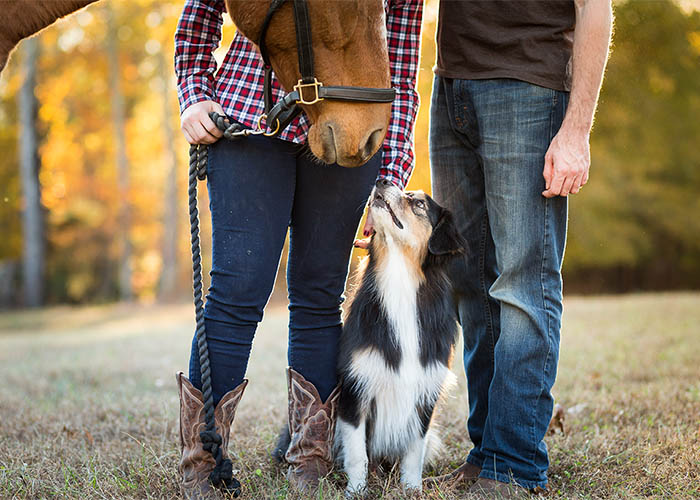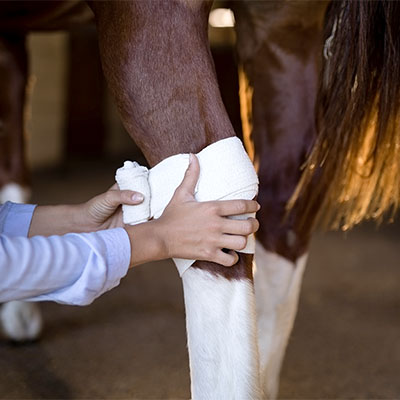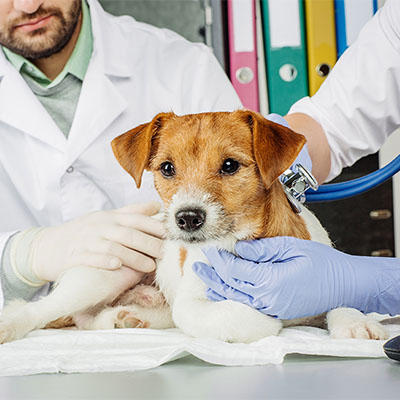
As horse lovers and pet lovers, we all have the well-being of our beloved animals at the forefront of our minds. By integrating equine insurance and pet insurance into your animal care plans, you can be assured that you are safeguarding your budget against high veterinary costs and having to make potentially difficult decisions.
From health insurance to car insurance, many of us are familiar with insurance products. Insurance is so popular because it provides protection for a set fee each month. While insurance is a familiar concept, some people are apprehensive about insurance for their horse(s) and/or pet(s). However, these programs can support you and your animal in a wide variety of ways. We sat down with a few industry professionals to learn a bit more about equine insurance and pet insurance while understanding the greatest benefits of these programs.
Reasons to Consider Insurance
Caring for your pets and horses can be an expensive endeavor, but also a rewarding one. With time, money, and emotional involvement in raising your animals, insurance allows you to feel more confident in their wellbeing and prevent financial hardships.
“A common phrase amongst horse owners is ‘the purchase price is the least expensive part of owning a horse’,” comments Heidi Wardle, an equine insurance agent at Foy Insurance in Exeter, NH. “Whether that purchase was a big investment or a small one – any horse can hurt themselves and/or pass away for various reasons, so protecting your investment is always a good idea. Some people spend a lot of money on their dream horse, and it would be a significant financial setback if that horse were to die. Other people may not have spent much on the horse, but know that if that horse needed significant vet care, they may not be in a position to pay for the potentially life-saving treatment. No one should have to euthanize their horse due to financial restrictions, no matter that horse’s [monetary] value. Having insurance – while it may not pay for everything – will certainly ease that burden and make those treatment decisions easier, should a situation arise.”

Greg Carlson, a local representative for State Farm Insurance Agency in Keene, NH, was joined by his loyal office dog Mumford as he discussed pet insurance with us. “From the heart, people make the decision to purchase pet insurance when the emotional commitment to the pet is like having a family member, or a loved one,” he explains. “If there is a life-threatening accident or injury, this individual might suffer a devastating impact to their finances to save the pet. If they don’t want to be put in that position to make that decision, they should consider buying in early to a policy when it’s less expensive.”
“The most common conversation is when the customer bought a breed of dog that is notorious for hip problems, and the individual thinks they are saving money by not having that monthly premium, and then a year later they are paying for that hip surgery,” Greg continues. “The cost of that surgery far outweighs the cost of that low monthly premium for the insurance.”

Chystin Sponsler, a Shipping Associate at The Cheshire Horse, has first-hand experience with the benefits of insuring her pet. She had a young Yorkshire Terrier named Fox who had difficulty synthesizing proteins. Because of this, Fox was on a strict diet and had to see a specialist. “I had an extremely positive experience with pet insurance,” she told us. “Insurance allowed us to address his various medical issues, and it truly saved me about $5,000 in out-of-pocket costs.”
What Does Insurance Cover?
While the specifics of what your pet and equine insurance cover will depend on your individual policy, Heidi and Greg gave us a generic look at what policies include. Be sure to ask your insurance agent if you have questions about your particular policy, or would like to ensure that your policy has the specific coverage that you need.
When it comes to pet insurance, most unexpected serious illnesses, diseases, and injuries are covered. Routine preventative measures, such as well-being exams and vaccinations, are typically not covered by insurance. Greg explains, “Depending on your insurance plan, you can expect to see surgeries, hospital stays, diagnostic tests, and prosthetic devices covered. Sometimes, prescription foods, prosthetic devices, and supplements can also be partially covered.”
When it comes to equine insurance, there are several different tiers of insurance to consider. You can work with your agent to properly determine the amount of coverage that you and your horse need. “I always advise my clients to think of their equine insurance policy as ‘financial aid’ rather than what most people are familiar with in terms of insurance,” Heidi says. “These policies are a bit different than other insurances, and, while they may not cover all of your veterinary costs, the coverage they do provide certainly helps when you are faced with a significant vet bill.”

A basic equine mortality insurance policy covers the value of the horse, much like life insurance, in the event that the horse has to be euthanized. Additional coverages such as Major Medical, Loss of Use (LOU), and Surgical can be added to the policy to reimburse you for expenses related to accidents, illness, injury, disease, or lameness. “With the latest advancements in veterinary diagnostics and treatment and the availability of so many options – you can now expect to see various limitations and restrictions within your policy for diagnostics (x-rays, ultrasounds, magnetic resonance imaging (MRI), bone scans, etc.), as well as certain treatments such as platelet-rich plasma (PRP), stem cells, shockwave, and interleukin-1 receptor antagonist protein (IRAP),” Heidi continues. “While you are never going to see reimbursement for routine costs of horse ownership such as vaccinations, dentistry, and maintenance joint injections, you can rely on your policy to be beneficial in the event of those unexpected costs such as lacerations, colic, pasture accidents, and the myriad of other ailments that our horses like to surprise us with!”
In the case of both equine insurance and pet insurance, it is important to note that preexisting conditions are not generally covered.
Jennifer Valley, a Sales Associate at The Cheshire Horse, found that her insurance was willing to cover a large portion of the costs when her cat needed emergency surgery due to a bowel obstruction. “My insurance company [Trupanion], is extremely easy to work with, dealing directly with my veterinarian for the majority of the procedural approvals,” she tells us. “I currently only have insurance for this cat, because he was a bottle-fed kitten who has developed health and behavioral issues since then, but I plan to purchase insurance for my five other cats as they age… I think that it will be very helpful.”
How Much Does Insurance Cost?
The price of your insurance varies greatly, depending on your horse’s or pet’s age, breed, health condition, and additional factors. However, most horse owners and pet owners find that insurance is affordable, especially when you consider the price of veterinary medicine as well as the replacement cost of your animals.
Insurance policies can be priced as low as $20 a month (for cats and dogs) to well over $1,000 a month, depending on the insured value of your horse or pet, the amount of coverage you are looking for, and how high of a deductible you are comfortable with. For example, the Markel Insurance website reports that an equine Medical/Surgical policy with a $15,000 limit ($1,000 deductible and 20% co-pay) will pay a $668 premium each year (or $56 a month); this policy does not have mortality or loss of use clauses, which would be an additional upcharge.

Work with your agent to find a policy that fits within your budget. Some companies also carry farm insurance or liability insurance, so you may be able to bundle your coverage for additional savings.
Typically, there are several different policies available for your animal with various coverage specifics; it is important to read all of the information carefully since the cheapest policy may not always be the right choice. “When comparing quotes be sure to compare all of the details, and when you do select your policy – be aware of what is and isn’t covered,” Heidi advises us.
“A lot of people think that because they didn’t pay very much for their horse, or that they don’t show their horse, or maybe their horse had a colic at some point – that they wouldn’t qualify for insurance,” Heidi comments. “However, there is usually some coverage available for all types of horses, at all values, breeds, and uses. Obtaining coverage does not always require veterinary exams or appraisals – in most cases, all that is required is paperwork completed by the owner.”
It is important to note that there are some alternatives to insurance as well. One of the reasons that insurance was created was to help pet owners afford emergency vet procedures. There are other programs in place, like Care Credit, that provide horse and pet owners with additional funds to pay for their pet’s necessary services. Similar to a credit card, Care Credit extends a line of credit to use on medical expenses. Morgan Monty, the Assistant Manager of Pet Sales at The Cheshire Horse, has used Care Credit in the past. “CareCredit has been a lifesaver with emergency vet appointments,” Morgan explains. “You can use it for veterinary fees (cat, dog, and/or livestock), human medical bills, contacts, glasses, dental bills, therapy, prescriptions, and so much more. For me, it has been a great alternative to insurance.”
Final Thoughts
Horse owners and pet lovers can all benefit from some level of insurance. Whether you have a beloved companion animal or a high-end competition animal, there is an insurance policy to fit your budget and your needs. Consider safeguarding the health and wellbeing of your horse and pet by integrating insurance into your pet-care and horse-care regime.
Insurance Resources
Pet Insurance
- 24 Pet Watch
- Allstate Pet Insurance
- ASPCA Pet Health Insurance
- Embrace Pet Insurance
- Farmer’s Insurance
- Figo Pet Insurance
- Geico
- Hartville Pet Insurance
- Healthy Paws Pet Insurance
- Lemonade
- MetLife Pet Insurance
- Nationwide
- Pet’s Best Health Insurance
- PetPlan
- Pumpkin
- Spot Pet Insurance
- State Farm Insurance
- Trusted Pals
- Trupanion
- USAA
Independent Equine Insurance Agencies
- Andreini Equine Insurance
- Blue Bridle Insurance
- Broad Stone Insurance
- C. Jarvis Insurance
- Corinthian Insurance
- Cunningham and Cunningham Livestock Insurance
- Don Ray Insurance
- Eaton and Berube Insurance
- Emo Agency
- Epic Brokers
- Foy Insurance
- Fry’s Equine Insurance
- Hallmark Equine Insurance Agency
- Horse Works Insurance Specialists
- Horse Insurance Specialists
- Kay Cassell Insurance
- Lyman Insurance
- Martingale Underwriters
- Murfield Insurance
- Olive Insurance Agency
- Star H Equine Insurance
- Tin Top Insurance Agency
Online Equine Insurance
- American National
- American Equine Insurance Group
- ASPCA Pet Health Insurance
- EquiSure
- Great American Insurance Group
- Marshall and Sterling
- Markel Insurance
- Mennonite Mutual
- Nationwide
- QBE
- Taylor, Harris Insurance Services (THIS)
- The Hartford
- Travelers
Do you have an insurance agency that you would like to add to this comprehensive listing? Please email the information to [email protected].
